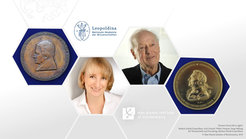Two Leopoldina Honors for MPIB Scientists
The oldest continuously existing learned society in the world honors Walter Neupert posthumously with the Cothenius Medal and Elena Conti with the Schleiden Medal.

Walter Neupert examined the power plants of the cells
The biochemist and cell biologist Prof. Dr. Walter Neupert (1939-2019) investigated the structure and biogenesis of mitochondria. Mitochondria are cell organelles, responsible for energy conversion and often described as power plants of cells. Neupert's research focused on the question of protein transport in mitochondria, a process he investigated as one of the first scientists. One of Neupert's particular achievements was to open up biochemistry - initially a discipline characterised by basic research - to medicine. For example, mitochondrial disorders play an important role in heart diseases, metabolic diseases and cancer. Neupert and his research group provided fundamental insights into protein import, protein folding and the structure of mitochondria. In his research, Neupert deciphered mechanisms with fundamental cell biological significance extends far beyond the field of mitochondrial research and which have been incorporated into textbooks. As a teacher and mentor, he has trained and promoted numerous outstanding scientists.
Walter Neupert studied chemistry and medicine at the Ludwig Maximilian University (LMU) in Munich, where he received his PhD in 1968 on the biogenesis of mitochondria. This subject also accompanied him as professor at the Georg-August-Universität Göttingen (1977-1983) and LMU Munich (1983-20¬¬¬10). From 2008 to 2017, he continued his research as a Max Planck Fellow at the MPIB in Martinsried. His numerous awards and honors include the Bavarian Maximilian Medal for Science and Art awarded in 2008 and the Ernst-Jung Medal for Medicine in Gold presented to him in 2015. Neupert became a member of the Leopoldina in 1993 and received the Schleiden Medal from the Academy in 1999.
Elena Conti analyzes the mediator of the genetic code
Elena Conti, head of the Department of “Cellular Structural Biology”, has gained fundamental new insights into RNA transport within the cell and RNA metabolism. Among other things, the RNA, the so-called ribonucleic acid, ensures that the DNA's genetic information is translated into proteins. Conti and her department are particularly investigating the degradation of RNA by protein structures, which takes place in the cell when RNA molecules are no longer required or are defective. Conti has succeeded in deciphering the atomic structure of one of the largest RNA degradation machines, the RNA exosome. The scientist is also interested how the exchange of information in this area works within the cell. For example, she has analyzed the function of the relevant protein complex (exon-junction complex) in the detection and degradation of defective messenger RNA. In addition, Conti and her team succeeded in deciphering the ski complex, which supplies the RNA degradation complex (exosome) with RNA molecules and thus activates it.
Elena Conti studied chemistry at the University of Padua and biochemistry at Imperial College in London, where she received her PhD in 1996 with a thesis on protein crystallography. She then went to Rockefeller University New York, USA, as a postdoctoral fellow. In 1999, she became head of a research group at the European Molecular Biology Laboratory (EMBL) in Heidelberg. In 2006, she became Director of the Research Department “Structural Cell Biology” at the MPIB in Martinsried. In 2007, she was appointed Honorary Professor at the LMU Munich. In 2008, Conti and Elisa Izaurralde received the Gottfried Wilhelm Leibniz Prize for their scientific achievements. In 2014 she was awarded the Louis Jeantet Prize. She has been a member of the Leopoldina since 2009. In 2014 she was also elected into the Academia Europae.
[FA]












